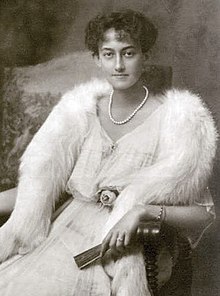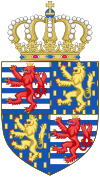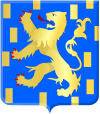|
Princess Antonia of Luxembourg
Antoinette Roberte Sophie Wilhelmine (7 October 1899 – 31 July 1954), commonly referred to as Antonia, was the last Crown Princess of Bavaria before World War II. By birth, she was a member of the Luxembourgish House of Nassau-Weilburg as the child of Guillaume IV, Grand Duke of Luxembourg and Infanta Marie Anne of Portugal. Antonia was a survivor of the Sachsenhausen concentration camp. Family Born at Schloss Hohenburg,[citation needed] at Lenggries in Upper Bavaria, Antonia was the fourth daughter of Guillaume IV, Grand Duke of Luxembourg, who reigned between 1905 and 1912, and Marie Anne, a princess of the Portuguese House of Braganza. She was the younger sister of two successive grand duchesses: Marie-Adélaïde and Charlotte. In the family she was called "Toni". Marriage and childrenAntonia became the second wife of Rupprecht, Crown Prince of Bavaria. The two were engaged on 26 August 1918.[1] At the time, Rupprecht was Generalfeldmarschall in the Imperial German army, and had successfully commanded the German Sixth Army at the Battle of Lorraine. This led to criticism of the close ties between the Luxembourgish Grand Ducal Family and the royalty of the German Empire at a time when Luxembourg was occupied by Germany. This added to the pressure already on Grand Duchess Marie-Adélaïde, who was forced to abdicate on 10 January 1919.[2] Despite the abdication of her elder sister, and the overthrow of the Kingdom of Bavaria in favour of a republic, the two were married on 7 April 1921 at Schloss Hohenburg. Antonia and Rupprecht had six children:
Later lifeIn 1925, she served as patron of the first ever Chrysanthemum Ball in Munich. Being anti-Nazi and connected to a resistance plot, the family was forced to flee to the Kingdom of Italy and then Kingdom of Hungary in 1939.[3] Five years later, the Nazis had occupied Hungary and were looking to arrest her husband, Rupprecht, who was underground in Italy. It was Nazi policy, that if one family member was accused of a crime, the entire family would be held liable. Hitler personally ordered the arrest of Princess Antonia and her children. A meeting with the British Foreign Office's summary reports Rupprecht as telling George V that he "remained convinced that the Fuhrer was insane."[3] During their imprisonment Antonia contracted typhus and was hospitalized in Innsbruck.[3] Once well, Antonia was shipped to the Sachsenhausen concentration camp where her adult children were also being imprisoned. As the Soviets got closer to the Third Reich, they were transported to Flossenburg concentration camp and finally to Dachau concentration camp.[3] The United States Army liberated the Dachau camp in 1945. During her time in the camps, Antonia was repeatedly tortured by Nazis for information on her husband, which she refused to share. Princess Antonia made it through World War II but the typhus, malnutrition and torture took its toll. Immediately after liberation, she returned to Luxembourg to recuperate. Although liberated that same month, the imprisonment greatly impaired Antonia's health.[3] Princess Antonia rarely talked about her time in the camps. It is a possibility that she also spent time in Buchenwald, but there are no official reports of this. She adamantly refused to set foot in Germany ever again. She lived the rest of her life in Italy and Switzerland.[3] On 31 July 1954, Princess Antonia passed away in Switzerland, having fulfilled her promise of never returning to Germany. Her husband, Prince Rupprecht, died little over a year later, in August, 1955. Ancestry
FootnotesBibliography
|
||||||||||||||||||||||||||||
Portal di Ensiklopedia Dunia


